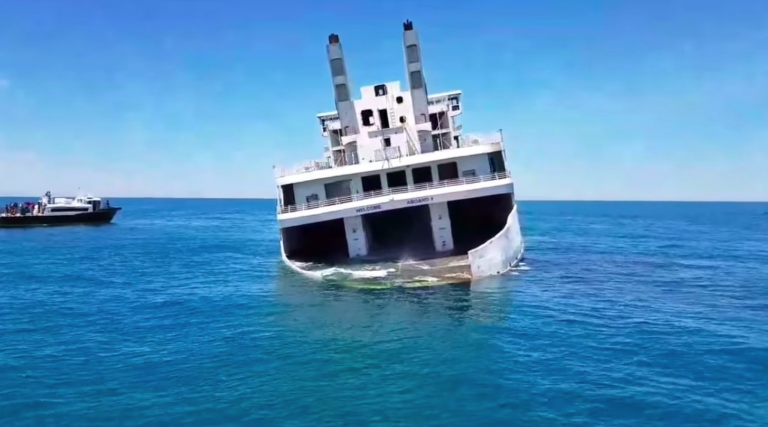Cape May-Lewes ferry sunk to expand artificial reef
A ferry boat that once transported countless people and vehicles between New Jersey and Delaware is on another mission after it was sunk last Friday.

A screen-capture from a video posted on YouTube by Wildwood Video Archive of the MV Twin Capes sinking last Friday.
A ferry boat that once transported countless people and vehicles between New Jersey and Delaware is on another mission after it was sunk last Friday.
The 320-foot MV Twin Capes, once part of the Cape May-Lewes Ferry fleet, is now sitting at the Del-Jersey-Land Inshore Reef located 26 nautical miles southeast of Cape May.
It joins other vessels that are now home to marine life, including the 205-foot Tamaroa, a famed Navy and Coast Guard ship immortalized in the film and book “The Perfect Storm.”
The sinking was captured on video and posted on YouTube.
The Delaware River and Bay Authority sold the ship to the Delaware Department of Natural Resources and Environmental Control for $200,000 in 2017. It last traveled the Delaware Bay during the summer of 2013.
In addition to the Tamaroa, MV Twin Capes joins the former Army freighter and Navy support ship Shearwater, the minesweeper Gregory Poole, and the 563-foot destroyer U.S.S. Arthur W. Radford, the largest vessel ever deployed off the East Coast.
Providing a habitat for a variety of marine organisms to grow along with food and habitat for fish and shellfish, the reefs are made of rocks, concrete and steel, and old ships and barges, according to the New Jersey Department of Environmental Protection.
“DEP studies have shown that these materials are colonized quickly with organisms such as algae, barnacles, mussels, sea stars, blue crabs, and sea fans that attract smaller fish which, in turn, attract black sea bass, tautog, summer flounder, scup, lobster and other sought-after species,” a New Jersey news release issued in 2016 says.
Officials say artificial reefs are also important for recreation and economic development purposes.
WHYY is your source for fact-based, in-depth journalism and information. As a nonprofit organization, we rely on financial support from readers like you. Please give today.




